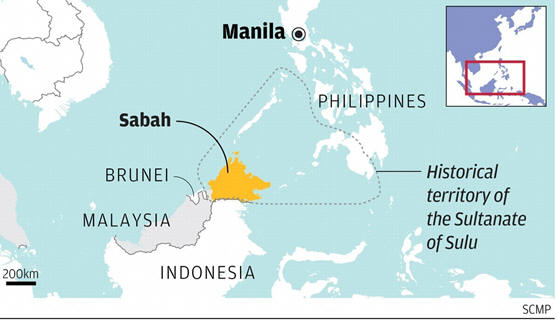www.aljazeerah.info
Opinion Editorials, November 2020
Archives
Mission & Name
Conflict Terminology
Editorials
Gaza Holocaust
Gulf War
Isdood
Islam
News
News Photos
Opinion Editorials
US Foreign Policy (Dr. El-Najjar's Articles)
www.aljazeerah.info
Why the Philippines Has No Justifiable Claim to Sabah and Never Had By Bunn Nagara, SCMP November 20, 2020 |
 |
 |
 |
|
Malaysians queue outside a polling station to cast their vote during the recent Sabah state election, 2020 |
Map of the Malaysian region of Sabah |
Manila’s move derives from the defunct Sulu sultanate’s disputed earlier claim to North Borneo when it was still part of the Brunei Empire As the ruling against China in the South China Sea shows, international law does not recognise claims based just on historical interpretation
A river in Sabah, Malaysia. The author states that Sabahans pressing for better federal representation want to be a greater – not a lesser – part of Malaysia, and that the Philippines’ claim has no historical justification. Photo: Handout The convoluted history of North Borneo (Sabah) and the Philippines ’ alleged association with it continue to haunt narratives of Borneo. It is time to unravel some enduring myths. Despite what is commonly known as “the Philippine claim to Sabah”, the Republic of the Philippines has no justifiable claim to Sabah and never had. Manila’s claim derives only from the defunct Sulu sultanate’s disputed earlier claim to North Borneo when it was still part of the Brunei Empire.
The main narrative in the Philippines is that Brunei granted the territory to Sulu in gratitude for Sulu’s military assistance during the 1660-73 Brunei Civil War. The narrative in Brunei is that no assistance was given, so no transfer of property occurred.
Besides, the dates given for Sulu’s supposed annexation of North Borneo are either 1658 or 1704, two years before or more than three decades after Brunei’s civil war. The Brunei sultans in both 1658 and 1704 were not among the three who reigned over the war period.
Brunei denies North Borneo coming under Sulu rule. Historical records suggest this outpost of Brunei was undeveloped, underpopulated and inhospitable at the time, especially the northeastern portion Sulu claims, and that the Sulu sultanate never occupied or administered it.
Neither Sulu nor the subsequent Republic of the Philippines ever possessed any document or other evidence to prove Brunei had bequeathed North Borneo to Sulu – nor provided any satisfactory explanation why they have nothing to support the claim.
When German businessman Gustav Overbeck acquired North Borneo from the Sultan of Brunei in December 1877, Sulu had already been pressing claims to it. To avoid trouble, Overbeck also “acquired” it from Sulu in January 1878.
Overbeck thus obtained two title deeds matching the two claims to sovereignty over the territory – Brunei’s, which was undisputed going back centuries, and Sulu’s ever-disputed assertions.
From experience, Bruneian and European interests found that Sulu had problems staying committed to the agreements it made. In 1903, Overbeck obtained an additional signed pledge from the Sulu sultan confirming that the January 1878 agreement was indeed for a cession and not a lease, and that it included several outlying islands off North Borneo’s east coast.
A … mistranslation by Spanish and American colonial officers … set the Sulu-Philippine claim in perpetual motion.
The earlier agreement the Sulu sultan signed with Overbeck in the original Malay was for “pajakan” (to pawn or cede) territory in perpetuity, with the sultanate also ceding all rights of sovereignty and possession over North Borneo.
However, a subsequent mistranslation by Spanish and American colonial officers to mean lease set the Sulu-Philippine claim in perpetual motion.
Spain was anxious for British recognition of its rule over Philippine and Sulu territories, so it offered all or any rights and entitlements over North Borneo to London in exchange, as formalised in the 1885 Madrid Protocol.
The late 19th and early 20th centuries saw rival Western powers competing for territory in the region. Sabah was taken over by the chartered British North Borneo Company before Britain annexed it in 1946, a move opposed by the US.
Britain’s annexation came 11 days after Philippine independence. Nonetheless, previous Spanish and US colonial administrations had rendered the Sulu sultanate defunct before the Philippine Republic in turn did as well.
Subsequent claimants to the obsolete Sulu throne then tried to perpetuate the claim to Sabah, even to grant “power of attorney” (since revoked) to the Philippines to claim it on its behalf. However, both Manila and Sulu have no locus standi to stake such claims.
In the 1963 Manila Accord, the Philippines agreed to the formation of Malaysia incorporating Sabah, without prejudice to Manila continuing its claim, if a UN-sanctioned plebiscite of Sabahans endorsed the formation. Malaya met that condition following deliberations by the Cobbold Commission.
Sulu partisans also agreed not to harass Malaysia if annual cession payments to descendants of the Sulu sultan continued indefinitely. However, the Sulu militants’ attack on Sabah in February 2013 violated the agreement, and the payments they deemed “rent” for the “lease” were halted.
The deadly armed raid on villages near Lahad Datu in eastern Sabah violated Malaysian, Philippine and international laws. For Manila to press any claim to Sabah only encourages more of such private assaults on Malaysia and Malaysians.
Malaysians queue outside a polling station to cast their vote during the recent Sabah state election. Photo: DPA
It also prevents closure of the issue and limits the prospect of the Brunei-Indonesia-Malaysia-Philippines East Asean Growth Area development project. And further threatens the Bangsamoro peace agreement in the southern Philippines in emboldening Sulu partisans, whose purely historical claim, however dubious, can only strengthen China’s similar claim to most of the South China Sea including Philippine maritime territory.
Approval of the Philippine bill in August 2020 to include Sabah in a Philippine map in passports violates the Manila Accord. It is a fatuous and hostile act by one Asean member against another, with considerable if still indeterminate costs to bilateral relations.
Regardless of interpretations of Malaysia’s origins, the country was established by Sabahans, Malayans, Sarawakians and Singaporeans as peoples of sovereign territories entering freely into it following consultations. For anyone else to claim Malaysian territory is a presumptuous act of aggression.
Sabahans pressing for better federal representation in the Malaysian federation and closer observance of the 20-point agreement want to be a greater – not a lesser – part of Malaysia. They do not constitute the fringe minority separatist element in Sabah.
Far from suggestions that Malaysia had approached the Philippines with offers to drop its claim, former Philippine opposition leader Benigno Aquino Jnr reportedly offered to drop it if Malaysia switched to supporting him instead of Ferdinand Marcos.
Malaysia found the prospect unrealistic not only because it would defy Asean solidarity in supporting the political opposition of a member country against the incumbent. Realistically, not even the Philippine president may forgo the claim in defiance of Congress and other parties in the Philippines.
Manila’s stubborn refusal to renounce a shaky anachronistic claim does not make it more legitimate.
As the Philippine-initiated Arbitral Tribunal ruling on China’s claim to nearly all of the South China Sea has shown, international law does not recognise claims based solely on historical interpretation.
Bunn Nagara is a Senior Fellow at the Institute of Strategic and International Studies (ISIS) Malaysia and an Honorary Research Fellow at the Perak Academy.
***
Bunn Nagara is a Senior Fellow at the Institute of Strategic and International Studies (ISIS) Malaysia and an Honorary Research Fellow at the Perak Academy. For more than three decades he has worked in various mass media and think tanks in Asia, contributing analyses and commentary in journals, books, magazines, academic and training institutions and the print and broadcast media.
***
Share the link of this article with your facebook friends
|
|
|
|
||
|
||||||


